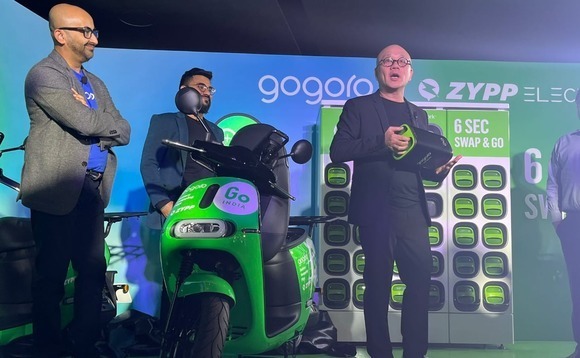
Deal focus: Zypp aims for the EV fast lane

Zypp Electric’s USD 25m Series B comes on the back of a business model pivot, a pandemic-driven boom, and a tie-up with its lead investor to put swappable batteries into its two-wheelers
When Neeraj Tyagi, founder of WeFounderCircle, met Akash Gupta and his wife Rashi Agarwal, he was impressed by their passion for ride-sharing despite a weak reception from local investors in India. The business model had delivered several unicorns in China, but it took Gupta and Agarwal a long time to secure an initial USD 200,000 in angel funding for Zypp Electric.
Tyagi backed the start-up as a personal investor. Venture Catalysts, an Indian angel network where he was a managing partner at the time, became the first institutional investor in 2018.
Since then, Zypp has pivoted from B2C to B2B and signed up a string of e-commerce clients that use its electric two-wheelers for last-mile delivery. Further confirmation of its rise came recently when Gogoro, a Taiwan-based developer of battery-swapping technology for scooters, led a USD 25m Series B.
The round – which also featured US-based Goodyear Ventures, early-stage Indian investors Grip Invest and 9Unicorns, and WeFounderCircle – was completed at a pre-money valuation was around USD 140m, according to a source close to the situation. This represents a nearly fivefold increase on the Series A in 2021, which saw Zypp raise USD 7m at a valuation of USD 30m.
"E-commerce and food delivery are long-term trends. On top of that, the Indian government is very focused on eliminating pollution caused by two-wheelers, especially delivery vehicles," said Homer Sun, a Gogoro board member. Sun formed the NASDAQ-listed special purpose acquisition company (SPAC) that merged with Gogoro at a valuation of USD 2.35bn last year.
Gogoro and Zypp announced a strategic partnership in November of last year intended to accelerate the latter's expansion. It involves Gogoro helping Zypp implement its swap-and-go battery technology, which eliminates the need for charging infrastructure because vehicles are stationary only for the 30 seconds it takes to replace the battery.
The capital injection effectively doubles down on this by providing the resources for Zypp to double the size of its fleet from 10,000 to 20,000 vehicles. The company expects to have operations in 20 cities by the end of 2025; at present, it is in the Delhi National Capital Region, Bengaluru, and Pune.
In the early days, Zypp's expansion was routed in collaboration with urban transit authorities to install hubs for dockless e-bikes close to subway stations for use by commuters. The C2C model gained traction but it soon proved unsustainable.
"Between 2016 to 2018, several ride-sharing companies launched in India and hardly any of them survived," said Nikhil Aggarwal, founder and CEO of Grip Invest, who contends that the market wasn't ready for a shared transportation model, in terms of demand or infrastructure. "But Zypp was able to pivot into B2B and really understand the B2B opportunity."
The pivot started in 2019 through tie-ups with e-commerce platforms FlipKart and JioMart and with online grocery store BigBasket. Then came the pandemic, which changed everything. For seven or eight months, retail stores were completely shut down and remote consumption – online shopping and food delivery – boomed.
"At that time, people were so scared that Zypp was considered courageous for even venturing outside to handle deliveries. People would wait for Zypp's delivery boys to come every morning. Suddenly, everyone loved this brand. It was a very interesting inflection point in their journey," said Tyagi.
The company needed to scale quickly and maintaining a directly owned fleet didn't help in this regard. The solution was to go asset-light and lease electric two-wheelers instead of purchasing them.
Grip Invest became Zypp's first e-bike leasing partner in July 2020, according to Nikhil Aggarwal. Every quarter, Grip Invest would expand the lease agreement to include more vehicles in accordance with rising demand. Zypp also worked with local electric vehicle (EV) manufacturers Hero Electric and Kinetic Green to acquire more e-bikes, mostly through leasing arrangements.
After 30 months of collaboration, Grip Invest joined a funding round and became an investor. "We've always received our returns on time and Zypp has grown its monthly revenue nearly 30x since we started working together," said Nikhil Aggarwal. "We were very excited to participate in their equity round. You could say we had the luxury of doing the most in-depth diligence."
As an investment arm of the eponymous global tyre manufacturer, Goodyear Ventures is mandated to invest in the future of mobility. However, its route into Zypp's Series B was unusual. The start-up reached out to Bin Zhou, a principal at Goodyear Ventures, through Linkedin, sparking months of communication and an India site visit. This is the VC unit's first investment in India.
Zhou's faith in the start-up was underpinned by two factors: the drop in EV prices to a level equal to or below that of traditional gasoline vehicles; and India's ongoing rural-urban migration, which ensures a plentiful supply of young and affordable drivers.
Latest News
Asian GPs slow implementation of ESG policies - survey
Asia-based private equity firms are assigning more dedicated resources to environment, social, and governance (ESG) programmes, but policy changes have slowed in the past 12 months, in part due to concerns raised internally and by LPs, according to a...
Singapore fintech start-up LXA gets $10m seed round
New Enterprise Associates (NEA) has led a USD 10m seed round for Singapore’s LXA, a financial technology start-up launched by a former Asia senior executive at The Blackstone Group.
India's InCred announces $60m round, claims unicorn status
Indian non-bank lender InCred Financial Services said it has received INR 5bn (USD 60m) at a valuation of at least USD 1bn from unnamed investors including “a global private equity fund.”
Insight leads $50m round for Australia's Roller
Insight Partners has led a USD 50m round for Australia’s Roller, a venue management software provider specializing in family fun parks.







